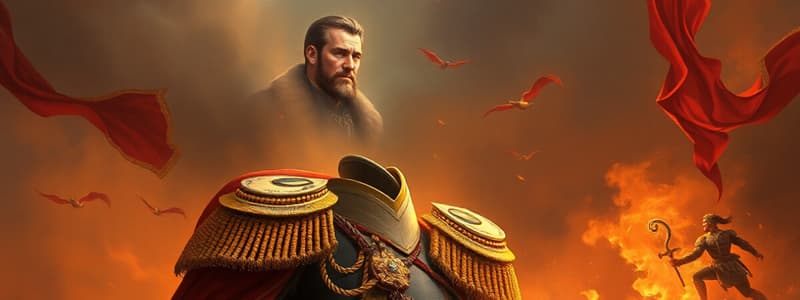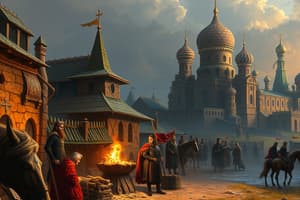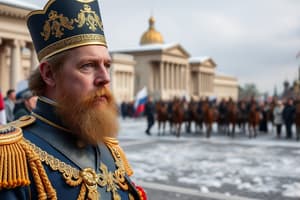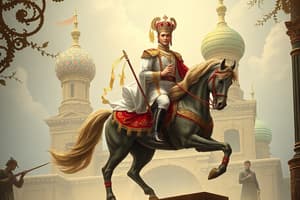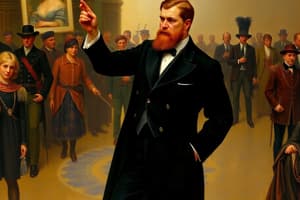Podcast
Questions and Answers
Rasputin, a mysterious holy healer, gains the attention of Tsar Nicholas II and Tsarina ______.
Rasputin, a mysterious holy healer, gains the attention of Tsar Nicholas II and Tsarina ______.
Alexandra
Rasputin seemingly heals Alexei by removing him from his doctor-prescribed ______.
Rasputin seemingly heals Alexei by removing him from his doctor-prescribed ______.
aspirin
The tabloids publish sensationalized stories about Rasputin and his influence on the ______ and Tsarina.
The tabloids publish sensationalized stories about Rasputin and his influence on the ______ and Tsarina.
Tsar
The Tsar fails to use the period of economic recovery to improve his ______.
The Tsar fails to use the period of economic recovery to improve his ______.
Signup and view all the answers
The public fears that Rasputin is manipulating the ______.
The public fears that Rasputin is manipulating the ______.
Signup and view all the answers
Tsarist rule in 19th century Russia was characterized by ______ and a lack of citizen rights.
Tsarist rule in 19th century Russia was characterized by ______ and a lack of citizen rights.
Signup and view all the answers
Alexander II's reforms sparked controversy, with some viewing him as a ______ and others challenging autocracy.
Alexander II's reforms sparked controversy, with some viewing him as a ______ and others challenging autocracy.
Signup and view all the answers
Alexander III believed his father's reforms weakened the Tsar's ______.
Alexander III believed his father's reforms weakened the Tsar's ______.
Signup and view all the answers
Nicholas II's coronation was marred by a deadly ______, killing nearly 1,500 people.
Nicholas II's coronation was marred by a deadly ______, killing nearly 1,500 people.
Signup and view all the answers
Under Nicholas II, public discontent grew as Russia failed to ______ and grant basic rights to its people.
Under Nicholas II, public discontent grew as Russia failed to ______ and grant basic rights to its people.
Signup and view all the answers
Lenin's brother was executed for plotting to kill the ______.
Lenin's brother was executed for plotting to kill the ______.
Signup and view all the answers
The Russo-Japanese War resulted in a humiliating defeat for Russia, leading to a loss of public ______.
The Russo-Japanese War resulted in a humiliating defeat for Russia, leading to a loss of public ______.
Signup and view all the answers
Bloody Sunday saw Tsarist troops open fire on peaceful ______, killing at least 200.
Bloody Sunday saw Tsarist troops open fire on peaceful ______, killing at least 200.
Signup and view all the answers
Prime Minister Pyotr Stolypin implemented reforms to improve ______ and suppress dissent.
Prime Minister Pyotr Stolypin implemented reforms to improve ______ and suppress dissent.
Signup and view all the answers
The Bolsheviks remained largely ineffective and lacked resources to act, while Russia enjoyed a period of relative ______.
The Bolsheviks remained largely ineffective and lacked resources to act, while Russia enjoyed a period of relative ______.
Signup and view all the answers
Study Notes
Russia in the 19th Century
- Russia lagged significantly behind Europe in modernization efforts.
- Tsarist rule was marked by feudalism and limited citizen rights.
- Russia's societal development lagged behind that of other European nations.
The Reign of Alexander II
- Alexander II emancipated serfs to initiate modernization.
- Freed serfs were obligated to pay off debts to former lords over 49 years.
- His reforms generated debate, with some supporting his actions and others questioning the autocratic system.
The Assassination of Alexander II
- Alexander II was assassinated by a terrorist using a bomb.
- The assassination stemmed from rising discontent and calls for change within Russia.
The Reign of Alexander III
- Alexander III believed his father's reforms weakened Tsarist authority.
- He suppressed dissent, religious minorities, and increased Russian nationalism.
- The Okhrana, a secret police force, was established to crack down on dissent and further repress non-Russian groups.
The Reign of Nicholas II
- Nicholas II lacked the strength and preparedness of his father, Alexander III.
- He struggled with self-doubt and insecurity in his leadership.
- Despite claiming a divine right to rule, Nicholas II faced various challenges and limitations.
Nicholas II's Early Reign
- Nicholas II's coronation was marred by a deadly stampede, killing nearly 1,500 people.
- This event tarnished his image and intensified public dissatisfaction.
- Choosing to attend a party with the French, despite the tragedy, further eroded his popularity.
The Growing Movement for Change
- Tsarist rule in the time of Nicholas II prioritized maintaining power over the needs of the people.
- Russia's failure to modernize and provide basic rights to its citizens led to considerable discontent.
- Dissatisfaction grew, with some seeking Western models and others endorsing communism.
The Rise of Lenin
- Lenin's older brother was executed for plotting against the Tsar.
- Lenin was expelled from university for participating in student protests.
- He adopted Karl Marx's ideology, viewing communism as a solution for the working class.
Lenin’s Exile and Socialist Advocacy
- Lenin was exiled to Siberia for his communist beliefs.
- He published socialist newspapers during his exile.
- After release, he continued socialist activities throughout Europe.
- He established a communist newsletter to radicalize the Russian population.
The Split within the Socialist Party
- Lenin's inflexible leadership caused a split within the socialist party.
- He formed the Bolshevik faction, renowned for its ruthlessness and dedication to his ideals.
- The Menshevik faction disagreed with Lenin's radical approach.
The Growing Dissatisfaction
- Despite Tsarist efforts at reform, widespread dissatisfaction persisted.
- Peasants' poverty, workers' demands for safer workplaces, and liberals' desire for broader political rights all contributed to the unrest.
- Nicholas II grappled with escalating tension and unrest.
The Russo-Japanese War
- Russia's ambition to expand in Northern China clashed with Japan's interests.
- Russia suffered a humiliating defeat against Japan despite initial optimism.
- The defeat reduced public confidence and worsened the unrest.
Bloody Sunday
- Father Gapon led a peaceful protest with a petition for reform.
- Tsarist troops fired upon protesters, resulting in numerous deaths and injuries.
- Known as Bloody Sunday, this event severely undermined Nicholas II's authority, triggering further revolution.
The 1905 Revolution
- Bloody Sunday ignited widespread strikes and unrest across Russia.
- Liberals demanded greater political rights, peasants sought land ownership, and workers campaigned for improved conditions.
- Nicholas II, under pressure, implemented reforms, including establishing the Duma, a legislative body.
- However, his desire to maintain autocracy fueled ongoing discontent, making future revolution possible.
- Lenin and the Bolsheviks, though present, lacked the resources or influence to incite an immediate overthrow.
Stolypin's Reforms and Repression
- Prime Minister Stolypin introduced reforms, primarily in agriculture, while simultaneously suppressing dissent, often with extreme measures.
- Though improving the economy to some extent, Stolypin's policies involved harsh measures and executions of opponents.
- The groundwork for subsequent revolution was laid despite the relative stability achieved under his leadership.
- The Bolsheviks remained relatively inactive and lacking in immediate influence.
The Rise of Rasputin
- During a period of economic recovery under Nicholas II, a mysterious holy healer, Rasputin, gained influence within the royal family.
- Alexei, the Tsar's son, suffered from hemophilia. Rasputin's reputation, despite controversies with claims of healing, was based upon reputed, but unconfirmed, positive influence on Alexei.
- Rasputin's close ties to the royal family, despite his controversial lifestyle, remained considerable.
The Scandal of Rasputin
- Rasputin's lavish parties and associations with Russian nobility stoked rumors and gossip.
- The press, initially censored, eventually publicized scandalous stories of Rasputin's influence on the Tsar and Tsarina.
- Public perception feared Rasputin's growing influence on the Tsarist regime, despite credible evidence being lacking.
Russia's Unstable Future
- Nicholas II's failure to capitalize on economic recovery tainted his image.
- Notwithstanding developments, Russia's future remained uncertain.
- The impending World War I further complicated the volatile political landscape.
Studying That Suits You
Use AI to generate personalized quizzes and flashcards to suit your learning preferences.
Description
Explore the significant events and reforms during the 19th century in Russia, focusing on the reigns of Alexander II and III. Discover how modernization efforts and autocratic rule shaped the nation, leading to unrest and the infamous assassination of Alexander II.
